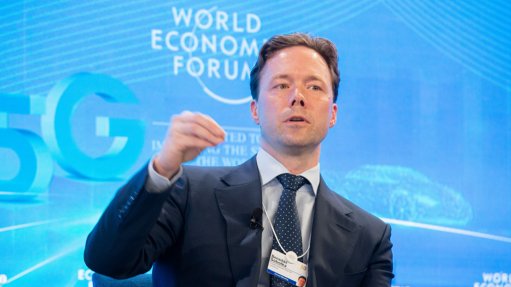
Benedikt Sobotka
With one Apple you can buy the world’s 50 largest mining companies, says Eurasian Resources Group CEO and Global Battery Alliance (GBA) co-chair Benedikt Sobotka.
Speaking at the Investing in African Mining Indaba in Cape Town, he noted that the market capitalisation of the world’s top five technology firms far outweighed that of the world’s top five mining companies.
Sobotka questioned how the global energy transition to clean, green energy was going to be funded with these numbers, especially considering the fact that the global mining industry required investment north of $1.7-trillion to meet growing minerals demand, driven by green technologies that needed far more, and different minerals.
“How are going to win an energy transition with these kinds of numbers? Now, if business does not like the industry, we are not going to achieve this.
“We need to fundamentally change the way we think about investment in this industry. We’ll not achieve [these goals] otherwise.
“We are setting ourselves up for failure because we are not investing enough in the mining industry.”
The green energy transition is a materials-intensive transition, emphasised Sobotka.
An average electric vehicle (EV) requires six times the mineral input of a conventional petrol-powered car.
As an example, an average EV needs 8.9 kg lithium, 13.3 kg cobalt, 24.5 kg manganese, 39.9 kg nickel and 53.2 kg copper.
An equivalent internal combustion engine vehicle, for example, uses only 11.2 kg manganese and 22.3 kg copper.
The global automotive industry last year became the world’s single largest user of cobalt in the world, said Sobotka.
The industry consumed 100 000 t of cobalt, which was equivalent to the entire world production of cobalt between 2018 and 2020.
By 2035, the world would need 62 new cobalt mines to meet demand. Copper demand is set to double.
Sobokta said current mining investment numbers were falling well short of the required numbers for a number of reasons.
This included the fact that many of the required mineral resources were in “complex jurisdictions” – sometimes “uninvestable countries” – which produced environmental, social and governance challenges.
These conditions then also tended to scare off investors and funders.
Sobotka said that this might need a rethink.
The demand for renewable energy required more mineral discoveries, he added, “and you are not going to find these discoveries in historical jurisdictions”.
He added that supply chains under pressure sometimes created “bad behaviour”, and emphasised that new-energy supply chains had to be sustainable.
He referred to the GBA, which consisted of 135 members, including civil society, government groupings, and mining and automotive companies.
Sobotka explained that it was necessary to enable the traceability of materials within the new energy industry as the supply chain grew.
To achieve this, the GBA this year piloted the Battery Passport. This provides an EV with a sticker that allows anyone to scan it with their phone, tracing the origins of the minerals in that vehicle.